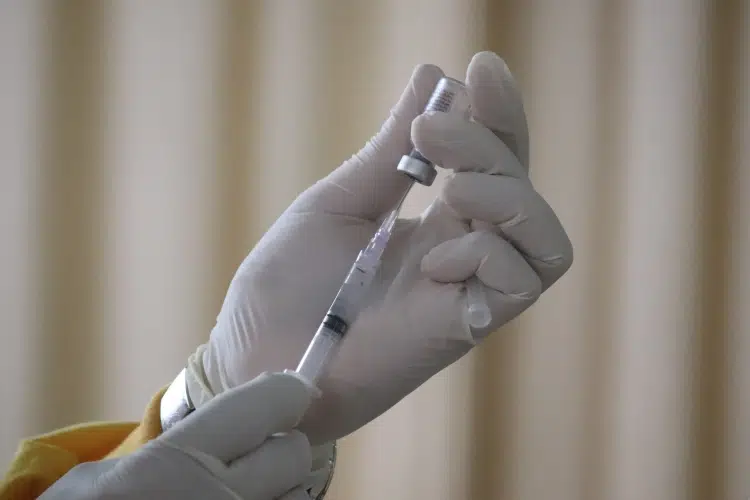Vaccines are often hailed as having many advantages, but the consequences are rarely mentioned. No matter how low the probability of adverse consequences to a vaccine is, such downsides may permanently change the lives of those who are affected.
Have you or a loved one experienced severe reactions to vaccines? There is help available.
Vaccine adverse reactions can have detrimental health effects, making you eligible for compensation. Get a free consultation from our team right now.
All claims are on contingency, so unless we secure compensation on your behalf, you'll owe no legal fees.
In case of adverse outcomes following the administration of certain vaccines listed on the Vaccine Injury Table, people who receive those vaccines or their loved ones may receive compensation through the National Vaccine Injury Compensation Program (NVICP).
A "no-fault" policy means no one is responsible for any injuries or damages sustained, whether it be the manufacturer of the vaccine or the organization that encouraged people to get certain vaccines.
In addition to marking the vaccines that can lead to injury compensation, the Vaccine Injury Table keeps a record of the specific adverse reactions that can justify compensation.

Applicants for NVICP must submit claims to the United States Court of Federal Claims. After that, the US Department of Health and Human Services (HHS) is responsible for deciding if the petition is legitimate. A judge reviews the HHS report and often holds an evidentiary hearing in which you may present your argument. After the Court has reviewed all evidence, he or she decides whether compensation should be awarded.
Pfizer, Moderna, Johnson & Johnson, and others all produce novel Coronavirus-19 (2019-nCoV) vaccines, which are not included in the NVICP Vaccine Injury Table.
Vaccine injury attorneys are lawyers who assist victims of vaccine-related injuries. The elderly, children, and adults may be injured by vaccines. Vaccines may have caused the injury in full or in part, and the injury may be permanent or temporary.
NVICP must be followed by all vaccine injury victims to receive compensation, but it's essential that victims remember this is a legal process that is overseen by a Federal Court. If the claim is to be heard in court, never mind awarded compensation, there are specific guidelines to follow.
In order to successfully pursue a vaccine injury claim, it is important to hire an experienced attorney. Ultimately, no compensation claim will automatically be accepted simply because there is an established compensation process.
It is possible to obtain compensation for the medical expenses incurred due to the side effects of a vaccine injury claim under the NVICP. Along with from compensation for lost earnings, victims may also be compensated for rehabilitation and therapy bills, as well as pain and suffering.
The time limit to file a vaccine injury claim generally is three years after the symptoms first appear.
The majority of vaccine victims are unaware that they can receive compensation if they are injured as a result of the vaccine. Most often, they wait and observe if the symptoms improve over time. There are, however, some who opt to schedule doctor's appointments and undergo possible medical tests. Especially when they happen unexpectedly, these expenses can be overwhelming.
Although there are many different vaccines listed in the VICPT, it is important to be aware that nonseasonal flu vaccinations are not covered by the VICP. Some of the vaccines that are listed include the Polio vaccine, multiple Hepatitis vaccines, RV (rotavirus), Seasonal flu, Tetanus/Td, MMR, DTP, and others. This being a non-inclusive list of examples, it's important to review your case with a lawyer to determine whether you're eligible for a claim or not.
Reflected on the Vaccine Injury Table are not only the individual vaccines covered by NVICP vaccine injury claims but also some specific side effects that are covered. These include:
This is an inflammatory disorder that affects primarily the joints but may also affect other organs and body systems. After vaccination, symptoms may appear as soon as seven days after vaccination or as long as 42 days later.
Generally occurs within 4 hours of vaccination, a severe allergic reaction.
The intestines fold or collapse in on themselves in intestinal intussusception. In some cases, this may be fatal because it prevents proper digestion. A vaccine reaction may begin as soon as 1 day after administration, or it may not occur for 21 days.
A fainting spell is called vasovagal syncope by physicians. Blood pressure and heart rate suddenly drop when you faint. After vaccination, symptoms may appear within an hour
One of the most common side effects noted in the Vaccine Injury Table is shoulder injury related to vaccine administration, otherwise known as SIRVA. Each vaccine in the table is at risk for this injury. In other words, SIRVA is not caused by the actual contents of the vaccination; rather, it is caused by the injection method itself - an injection into the upper arm.
Any injection can cause SIRVA if it is administered incorrectly. Symptoms include numbness and pain in the affected area. If the injections are forced too deeply, they can damage delicate tissue within the arm or shoulder if the injection is not intramuscular.
As long as proper precautions are taken when administering vaccines, SIRRV can be completely prevented. In any case, lawsuits usually aren't appropriate in the case of SIRVA. SIRVA is, however, covered under the NVICP, and individuals who suffer negative effects from the disease can apply for compensation through the NVICP.
Contact our team now for a free case review if you are not sure whether you are eligible to claim vaccine injury compensation. We can answer your questions about your vaccine or symptoms regardless of whether you feel that they are covered. In the event that you move forward with your claim, no legal fees will be charged unless the claim is successful.